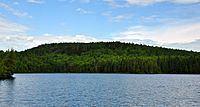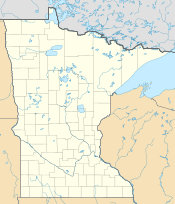Eagle Mountain (Minnesota) facts for kids
Quick facts for kids Eagle Mountain |
|
|---|---|

The 2,301-foot Eagle Mountain, seen across Whale Lake. July 2014.
|
|
| Highest point | |
| Elevation | 2,301 ft (701 m) NGVD 29 |
| Prominence | 1,321 ft (403 m) |
| Listing | U.S. state high point 37th |
| Geography | |
| Parent range | Misquah Hills |
| Topo map | USGS Eagle Mountain |
| Climbing | |
| Easiest route | Maintained hiking trail |
Eagle Mountain is the highest natural point in the state of Minnesota, United States. It stands at about 2,301 feet (701 meters) above sea level. You can find it in northern Cook County. It is inside the Boundary Waters Canoe Area Wilderness and Superior National Forest. This area is part of the Misquah Hills, northwest of Grand Marais. Eagle Mountain is also a special Minnesota State Historic Site.
Eagle Mountain is quite close to Minnesota's lowest point. That low point is Lake Superior, which is about 600 feet (183 meters) above sea level. The mountain is only about 12 miles (19 km) away from the lake. Eagle Mountain is part of the Canadian Shield. This is a very old, rocky part of the Earth's crust. There is also another, smaller peak named Eagle Mountain in northern Minnesota. That shorter peak is part of the Lutsen Mountains ski resort.
Contents
Exploring Eagle Mountain
Hiking to the Top
Hiking to the top of Eagle Mountain is an exciting adventure. The walk usually takes about two and a half hours. The trail to the peak is about 3.5 miles (5.6 km) long. You will climb about 550 feet (168 meters) in elevation. The path is rocky and can be a bit challenging, but it is worth it!
About halfway along the trail, you will reach Whale Lake. This lake offers two campsites for hikers. It is a great spot to rest or even spend the night. The very top of Eagle Mountain has a special marker. It is a plaque that shows you have reached the highest point.
Getting Your Permit
You need a permit to hike parts of this trail. This is because some areas are inside the Boundary Waters Canoe Area Wilderness. Permits help protect this beautiful natural area. You can get a free, self-issued permit. These are available at any Superior National Forest ranger station. You can also often find them right at the trailhead kiosk. Just follow the instructions there to get your permit.
A State High Point
Eagle Mountain is a very important peak for people who enjoy "highpointing." Highpointing is a hobby where people try to visit the highest natural point in every U.S. state. Out of all the highest points in the U.S. states, Eagle Mountain ranks 37th.
Images for kids
 | Kyle Baker |
 | Joseph Yoakum |
 | Laura Wheeler Waring |
 | Henry Ossawa Tanner |







